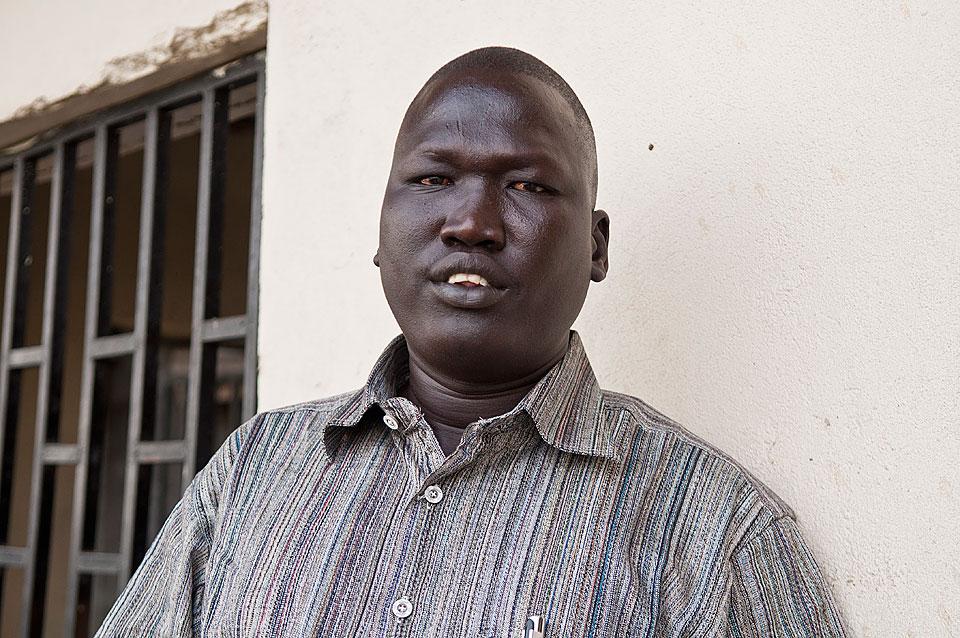From a Tent in Cattle Country

LWF South Sudan Emergency Coordinator Michael Mading © LWF/Melany Markham
LWF Worker Coordinates Relief Work in Jonglei State, South Sudan
Michael Mading reported back to work at the office of The Lutheran World Federation (LWF) in Juba on 4 January after spending Christmas with his family.
A wave of cattle raids in Jonglei State had left hundreds of people dead and thousands more homeless. The LWF response to those affected by the violence was in full swing, and Mading left Juba the next day for Bor, Jonglei’s capital, to help coordinate emergency operations on behalf of the ACT Alliance, of which the LWF is a founding member.
Immediate deployment like this is typical during an emergency. As LWF South Sudan’s emergency coordinator, Mading needs to be ready to go almost anywhere in the country at a moment’s notice.
When he arrived in Bor, he went immediately to meet with representatives of the United Nations and other agencies responding to the attacks.
“When an emergency happens, the first thing you have to do is coordinate so that you understand who the other agencies are that are willing to respond,” said Mading.
After agreeing on how to coordinate the work, getting staff on the ground is the next most important thing. In Jonglei, attacks were still occurring after emergency operations began, so security was–and still is–a major issue.
“It was volatile because some of the attackers were on the ground in Pibor,” said Mading. “We agreed to move into the county and on 10 January, I got myself to Pibor.”
Basic Conditions
Originally from Bor, Mading’s knowledge of the area helped him prepare and cope with the conditions which were basic, at best. “I bought food in Bor before I went to the field. We all lived in the same compound, and we pooled our money and food and hired someone to cook for us,” he said.
“It’s hard,” he commented, noting that one day he was out working and didn’t have any lunch. When he came back from the field, there was no one at the compound to cook a meal. “So I didn’t have supper either.”
Accommodation was just as difficult as one of the largest non-governmental organizational compounds in Pibor had been looted by the attackers. For the first week, Mading had to share a tent with another aid worker. Afterwards he was able to live in his own tent, provided by the LWF, for the next month.
“There are only 32 houses in the whole of the town and most of the people ran to the bush. It was a ghost town,” said Mading. This meant that to get aid to the majority of the people, the agencies needed to work outside the town.
Mading and a group of aid workers went to Likongole, where conditions were even more difficult than in Pibor. With no pit latrines, the workers had to dig their own holes and fill them in after they were finished. Likongole was also very insecure at the time.
Despite the conditions, the group Mading was with managed to make an assessment of the situation and convey this information to aid agencies based in Pibor and elsewhere in the country.
Helping, Not Harming
But talking to people who had experienced the violent attacks wasn’t always easy.
“Some people did not want to share what had happened to them with other people, but a few were very open,” said Mading. “There were those who felt that by sharing, maybe they could recover what they had lost, but there were those who would rather forget the horror of the situation.”
Mading can understand their reaction because he fled himself from violence in Jonglei in 1997. When he went to Pibor this time, he saw the river that he had crossed on the way to Ethiopia. He was nine at the time and with a group of children who took more than 15 days to walk to their final destination.
Returning to South Sudan 13 years later, Mading drew on his own experiences as a refugee to help people rather than getting caught up in the conflict.
“I went to that place with the strong belief that I have to save life. People don’t want to know which tribe you are from, they need to be served. I did not feel insecure,” he said.
The LWF is one of over 20 organizations working in Pibor. The emergency phase is now completed and the focus has shifted to rebuilding. But there are many other places in South Sudan that will still need Mading’s expertise since cattle raiding and tension with the North mean that violence can easily be ignited.
Fortunately, there are many people like him in South Sudan and similar places who have a combination of experience and education that makes them highly competent emergency workers. It is these people who are at the frontline of emergency response now and for years to come.
(830 words) (Written for LWI by Melany Markham in Juba, South Sudan)

